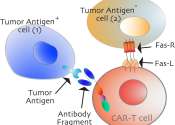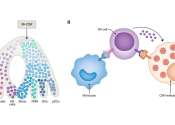Last update:
Immunology news
Neuroscience
Certain immune cells play an important role in the early stages of multiple sclerosis, twin study shows
Multiple sclerosis (MS) is a chronic inflammatory disease in which the immune system attacks the central nervous system. This impairs the transmission of signals between the brain and body and can lead to deficits in vision, ...
2 hours ago
0
14
CAR-T found to be safe and effective on an outpatient basis in community hospitals
In the largest prospective study to date examining the use of chimeric antigen receptor (CAR)-T therapy in a community setting on an outpatient basis, patients with relapsed or refractory large B-cell lymphoma (LBCL) responded ...
3 hours ago
0
0

Blood cancers: Expert explains what you need to know
Blood cancer is not a diagnosis anyone wants to receive, but understanding the different types of this disease and how best to catch them early is essential, one expert says.
5 hours ago
0
0

Trial shows timing matters when adding immunotherapy to chemoradiation for limited-stage small cell lung cancer
People with limited-stage small cell lung cancer may benefit from adding immunotherapy to chemoradiation, but not if both treatments are given at the same time, new research finds. The results suggest that the timing of when ...
3 hours ago
0
0

What is CAR-T cell therapy? Oncologist explains
Roughly 635,000 new cases of lymphoma were diagnosed worldwide, according to the World Cancer Research Fund International's most recent report. Survival rates for aggressive lymphomas have improved significantly thanks to ...
Sep 29, 2024
0
0

Study finds estrogens play a hidden role in cancers, inhibiting a key immune cell
Estrogens are known to drive tumor growth in breast cancer cells that carry its receptors, but a new study by Duke Cancer Institute researchers unexpectedly finds that estrogens play a role in fueling the growth of breast ...
Sep 27, 2024
0
52

Research reveals mechanism of effector-triggered immunity
A pair of studies examining immune response in C. elegans reveal broad implications for understanding pathogen detection in higher animals and the evolutionary origins of immunity itself.
Sep 27, 2024
0
8

Circadian rhythm disruption linked to lung inflammation
In a study published in the journal Frontiers in Immunology, researchers at the University of Arizona Health Sciences Center for Sleep, Circadian and Neuroscience research have explored the effects of circadian rhythm disruption ...
Sep 27, 2024
0
30

Vape residue may harm unborn babies, mouse study suggests
Exposure to vape and e-cigarette residue on surfaces while pregnant could put unborn babies at risk of immune system damage, new research suggests.
Sep 27, 2024
0
39

Immune cell analysis helps improve monitoring of rejection risk in kidney transplants
Currently, kidney transplantation is the most effective treatment to ensure survival and improve the quality of life of patients with end-stage chronic kidney disease, and it is widely practiced in health care systems. However, ...
Sep 27, 2024
0
0

'Undetectable' HIV patients could hold key to treatments
A rare group of HIV-positive people who maintain undetectable levels of the virus in their blood without medication could hold the key to new therapies for others living with the disease, says a leading genome expert.
Sep 27, 2024
0
0

Study finds asthma rates lower in children who received only breast milk at birth hospital
Infants who were exclusively fed breast milk during their hospitalization at birth were 22% less likely to develop asthma in early childhood, according to research presented during the American Academy of Pediatrics 2024 ...
Sep 27, 2024
0
0

Researchers discover new bacterium that causes gut immunodeficiency
Cleveland Clinic researchers have discovered a new bacterium that weakens the immune system in the gut, potentially contributing to certain inflammatory and infectious gut diseases.
Sep 26, 2024
0
18

Unexpected immune response may hold key to long-term cancer remission
Results from a preclinical study in mice led by EPFL, and a collaborative clinical study in patients show that the type 2 immune response—associated with parasitic infection and thought to play a negative role in cancer ...
Sep 26, 2024
0
22

Researchers discover treatment for major cause of recurrent pregnancy loss
Among women who experience recurrent pregnancy loss, around 20% test positive for a specific antibody that targets the mother's own body. A Kobe University-led research team has now found a treatment that drastically increases ...
Sep 26, 2024
0
23

Novel antibodies against Klebsiella pneumoniae identified
Research at UMC Utrecht has identified 29 novel antibodies against the bacterium Klebsiella pneumoniae, an important cause of drug-resistant infections. Using genetic and functional approaches, the researchers also managed ...
Sep 26, 2024
0
25

Scientists develop CAR-T cells to target glioblastoma while sparing healthy tissue
Scientists at UNIGE and HUG have developed CAR-T cells capable of targeting malignant gliomas while preserving healthy tissue.
Sep 26, 2024
0
6

Metabolic reprogramming of T cells may enhance checkpoint inhibitor therapy
Stimulating a key metabolic pathway in T cells can make them work more effectively against tumors when combined with immune checkpoint inhibitor therapy, according to a preclinical study led by researchers at Weill Cornell ...
Sep 26, 2024
0
28

Nanobodies help decode the central mechanism of inflammation
The formation of pores by a particular protein, gasdermin D, plays a key role in inflammatory reactions. During its activation, an inhibitory part is split off. More than 30 of the remaining protein fragments then combine ...
Sep 26, 2024
0
4

Newly identified 'compound B' holds promise as better immune booster against cancer, chronic diseases
A team of University of Alberta researchers has created a molecular compound that activates the immune system and shows promise for becoming an effective and versatile treatment for cancer and chronic infections.
Sep 26, 2024
0
0

Combination treatment improves response to immunotherapy for lung cancer, mouse study shows
Researchers at the Francis Crick Institute, in collaboration with Revolution Medicines, have tested a combination of treatments in mice with lung cancer and shown that these allow immunotherapies to target non-responsive ...
Sep 25, 2024
0
31

Tumor-specific antibodies able to detect melanoma in its earliest stages, new study shows
Innovative research has unveiled promising advancements in melanoma detection, which could significantly enhance diagnosis and prognosis by identifying the disease at its earliest, most treatable stages.
Sep 25, 2024
0
0

An eye on viruses in wastewater: Q&A with virologist
Virologist Rúbens Alves, Ph.D., came to La Jolla Institute for Immunology (LJI) to contribute to life-saving vaccine research. As a member of LJI's Shresta Lab, Alves studied how T cells fight viruses such as SARS-CoV-2 ...
Sep 25, 2024
0
17

Immune cells caught between worlds: Researchers explore how innate-like T cells mature
Our immune system spans two worlds—innate and adaptive. Innate immune cells are like troops at the gate ready to hold off invaders and raise the body's alarms. Adaptive immune cells are specialists that take longer to respond ...
Sep 24, 2024
0
8













































